Dec 29, 2025
Dec 29, 2025
Director: Andrei Tarkovsky /Russia/Russian /205 mts
Viewers and critics always have their personal favorites, but some films achieve a masterpiece status that becomes unanimously agreed upon – something that's undoubtedly true of Andrei Rublev.
Andrei Rublev is the most Russian of films, emblematic of what everyone finds so fascinating and so maddening in the way Russians do things. In the case of Andrei Rublev the challenges to our complacent preconceptions are extraordinarily strident. For over three hours, the main protagonist does little more than observe. One of his most drastic actions is to take a sixteen-year-long vow of silence, not an auspicious premise for a movie. Its religious subject matter and flaunting of narrative convention bathe Andrei Rublev and its director Andrei Tarkovsky in a rarefied aura of sanctity or sanctimony. It is seen by its fervent admirers as the ‘film of films’, putting it in the same category as the book of books—the Bible.
Widely recognized as a masterpiece, Andrei Tarkovsky's 205-minute medieval epic, based on the life of the Russian monk and icon painter and was not seen as the director intended it until its re-release over twenty years after its completion. The film was not screened publicly in its own country (and then only in an abridged form) until 1972, three years after winning the International Critics Prize at the Cannes Film Festival.
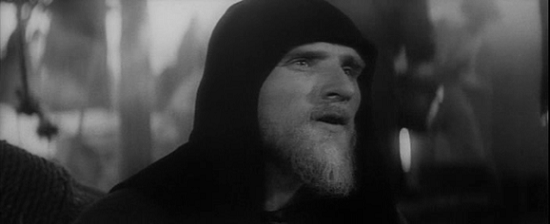
Andrei Rublev
From the first scene, following the flight of a rudimentary hot air balloon, we're whisked away by silken camera moves and stark compositions to a time and place where we're no less confused, amazed or terrified than Rublev himself. For the next three hours, we're down in the muck and chaos of medieval Russia, carried along on the tide of history through gruesome Tartar raids, bizarre pagan rituals, famine, torture and physical hardship. We experience life on every scale, from raindrops falling on a river to armies ransacking a town, often within the same, unbroken shot.
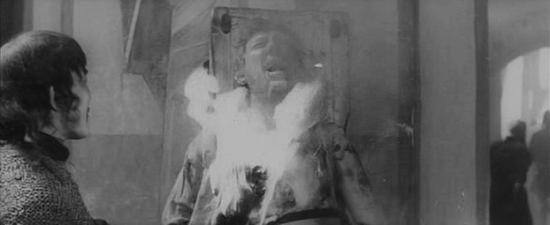
Gruesome scene from Tartar invasion
Presented as tableaux of seven sections in black and white, with a final montage of Rublev's painted icons in color, the film takes an unflinching gaze at medieval Russia during the first quarter of the 15th century, a period of Mongol-Tartar invasion and growing Christian influence. Commissioned to paint the interior of the Vladimir cathedral, Andrei Rublev (Anatoli Solonitsyn) leaves the Andronnikov monastery with an entourage of monks and assistants, witnessing in his travels the degradations befalling his fellow Russians, including pillage, oppression from tyrants and Mongols, torture, rape, and plague. Faced with the brutalities of the world outside the religious enclave, Rublev's faith is shaken, prompting him to question the uses or even possibility of art in a degraded world. After Mongols sack the city of Vladimir, burning the very cathedral that he has been commissioned to paint, Rublev takes a vow of silence and withdraws completely, removing himself to the hermetic confines of the monastery.
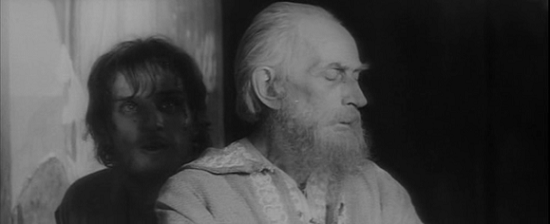
Andrei Rublev and Theophanes
Rising quickly out of this mire, the film's final section (a short story in its own right) concerns a boy named Boriska (Nikolai Burlyayev) who convinces a group of travelling bell-makers that his father passed on to him the secret of bell-making. The men take Boriska along, mostly because they pity and are amused by him, but they are quickly enthralled by the boy's ambition, determination, and confidence that he alone knows how to build the perfect bell. Boriska is soon commanding an army of assistants and peasant workers, and, indeed, his fierce temperament and refusal to accept anything but the best possible work and materials from the men fools the viewer -- possibly Boriska himself is fooled -- into thinking that he does in fact possess the secret, and that on the appointed day when the silver bell is lifted from the ground and its mallet set in place, it will ring. Amid this maelstrom of activity and confusion, Rublev appears; at first standoffish and mistrustful of the boy, he finds himself drawn to Boriska's courage and unselfconscious desire to create. Moved to put aside his vow of silence, Rublev serves finally as the boy's confessor, and he finds that, through Boriska, his faith, and art, have been renewed.
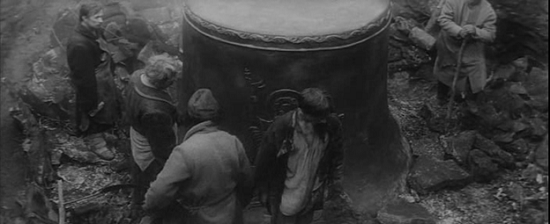
Boriska: Casting of bell
Despite its apparent formlessness, Andrei Rublev is precisely structured and entirely aesthetically coherent. Acts of creation are mirrored by acts of destruction, there are themes of flight, of vision, of presence and absence; the more you look, the more you see. And then there are the horses, Tarkovsky's perennial favorite: horses rolling over, horses charging into battle, swimming in the river, falling down stairs, dragging men out of churches. At times the screen resembles a vast Brueghel painting come to life, or a medieval tapestry unrolling. We're always conscious of life spilling out beyond the frame, and never conscious of the fact that this was made in 60s USSR.
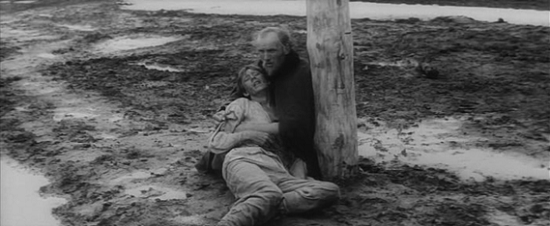
Rublev holding a collapsed Boriska after the erection of the bell
The characters in Andrei Rublev represent various types of spirituality, from the stern but spineless intellectualism of Kirill (brilliantly played by Ivan Lapikov) to the pagan revelers’ exuberant carnality, to Rublev’s humanist questioning. Andrei’s point of view is privileged only insofar as he remains a spectator alongside the viewer, immune to the allure of action. We are never quite sure what he sees and how he sees it, and so we can neither be sure that we are seeing properly either. Nonetheless we feel an almost ethical imperative to keep watching. Perhaps this is the key to Tarkovsky’s personal aura: that he encouraged beaten and distracted people to look, both at the world outside and at their inner selves. It reminds us of the original meaning of the word ‘martyr’, the one Tarkovsky may really have had in mind when he began his diary: ‘witness’. Tarkovsky’s films bear witness to his world and posit the spectator as witness.
A series of "Hundred Favorite Films Forever"
25-Nov-2012
More by : P. G. R. Nair